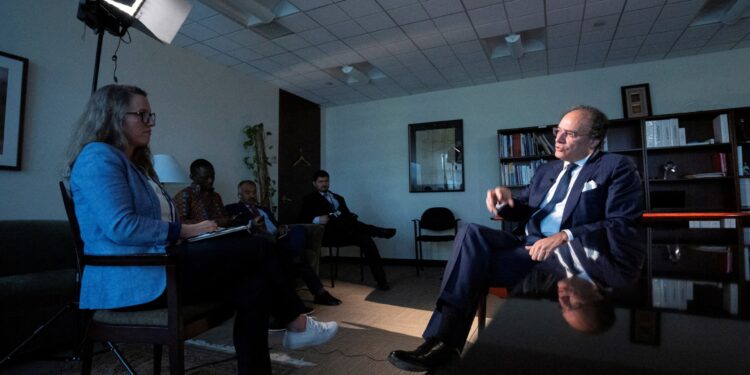2/18/2025–|Last update: 2/18/202511:25 PM (Mecca time)
Pakistani Finance Minister Mohamed Orangezib said that his country is able to collect the targeted revenues for this year without the taxpayers’ additional burdens, at a time when the government seeks to calm the criticisms it faced due to strict economic reforms, including imposing standard taxes and increasing energy prices.
In an interview with Bloomberg on the sidelines of a conference in Al -Ula, Saudi Arabia, Orgazib stressed that “the current trend is moving in the right track,” noting that any possible deficit in revenue will be compensated by expanding the tax base and promoting tax compliance.
Commitment to the IMF agreement without new taxes
Raising the tax rate to GDP is one of the basic conditions of the $ 7 billion loan program obtained by Pakistan from the International Monetary Fund, which was necessary to support the struggling economy and manage its growing debts.
To ensure that this loan was obtained, the government of Prime Minister Shahbaz Sharif increased taxes and raised energy prices last year, which sparked widespread popular anger.
Despite these challenges, the Minister of Finance said that he is confident of meeting the requirements of the International Monetary Fund program, noting that the tax rate to GDP reached 10.8% by the end of December, bypassing the target set at 10.6%.
He also stressed that the government will not impose any new tax measures during the current fiscal year ending in June. The first review of the program is scheduled to be held during this quarter.
New tax reforms in the agricultural sector
Orengazib also touched on the government’s plans to impose new taxes on agricultural income, stressing the importance of this step in expanding the tax base. The parliaments of the four regions in the country recently approved laws to increase taxes on agricultural income, a measure that was agreed with the International Monetary Fund to enhance the collection of revenues.
Pakistan had barely survived the failure to pay their debts in 2023, and companies are still suffering due to high taxes and energy costs. However, the Executive Director of the International Monetary Fund, Crystalina Georgiva, praised this month of Pakistan’s attempts to place itself on a sustainable economic growth path.
New opportunities amid global trade tensions
When asked about the impact of US President Donald Trump’s proposals to impose new customs definitions, Orongzeb saw that these changes might represent a “real opportunity” for Pakistan to strengthen its regional trade with the countries of the Middle East and Central Asia.
While Pakistan is facing sharp economic challenges, the government seems committed to continuing the required economic reforms without resorting to imposing more taxes, in an attempt to maintain the stability of the economy and gain the confidence of local and international investors.



